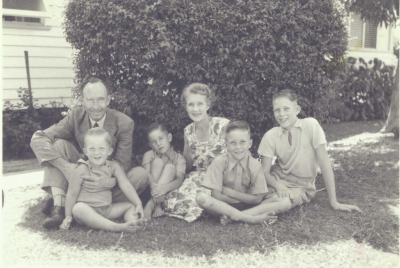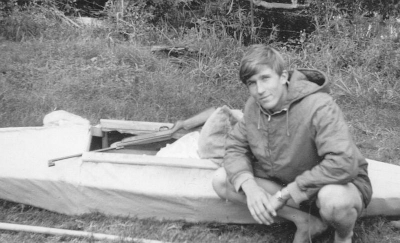I was born in Chelmer, Brisbane in 1951. I had three older brothers. My father had served in the RAAF during the 2nd World War as a Squadron Leader. In 1953, my father quit his accountancy job with Elders Smith Goldsborough Mort and purchased a grocery store, newsagency and post office, in a coalmining district called Dinmore, 21 miles to the West of Brisbane and 5 miles from Ipswich.

Loughrey Family(left->right) Kevin(me), Arthur(Dad), Peter, Beryl(Mum), Blair, John (Click to see Larger Picture)
My mother was always very ill with a serious heart condition which necessitated I be fostered out to the family of a coal miner. Life was hard and austere as it took Australia many years to recover from the war and this was particularly felt in rural areas. We had a water tank out the back of the shop and a pan-service outhouse as a toilet. Many years later I returned to the shop and was amazed how small it was; even more so our accommodation at its rear. I wondered how we all fitted in such a small space but my mother made a home for us all. Just before I turned 5 years of age, I was returned to my home and met with my brothers whom I couldn't remember as I was too young when I left home.
Initally I attended Dinmore Primary School across the road from our shop. It was had about 100 children and there was one teacher for two classes. My mother felt I was "a big fish" in a little pond so when I was to commence my 6th year, she sent me to Silkstone Primary School about 4 miles from where we lived. Silkstone School had over 1,000 pupils. Grade 6 consisted of 5 classes with 30 pupils in each class. I loved going to school and did well there academically. My father felt that we should all play sport so I took up tennis and hockey with my brothers, playing in a junior team with Bremer High School whilst still going to Silkstone Primary. Because I was doing well at school my family felt it would be best for me to attend Ipswich Grammar School because Bremer State Secondary School was over-crowded. My eldest brother John paid my first year's tuition at IGS and in that year I won a full scholarship which paid for my fees, books and uniforms for the 4 more years of attendance at IGS. In 1968, heart disease finally claimed my mother and so I decided to join the Army in order to get a university education. I had always wanted to be a doctor but my circumstances forced me to opt for my second choice, engineering.
My brothers and I grew up in a rural setting. Down Dinmore Road, towards the Bremer River, were the Dinmore Abbotoirs. My eldest brother worked there on holidays and would bring back the occasional organ for us all to dissect and comment upon. From an early age, I had a chemistry set and a microscope. One of my favourite pastimes was to grow cultures of microorganisms from grass put in a glass tumbler along with examining pollens from the various trees and flowers.
Near the Dinmore railway station were the cattle yards with a creek running through it that was often laden with fresh water crayfish that we would catch on a cotton thread and meat. In all directions was bush through which my brothers, friends and I would range, building cubby houses, tree houses and bridges across the creeks. Dinmore was famous for its white kaolin clay and there was a pottery factory that specialised in toilet ware. This was conveniently near the Rhonda and New Chum coal mines which we used to visit on school excursions and with the Boy Scouts. The hole from which the clay was extracted was large and deep and water collected there which then became a deep beautiful green colour from the lime in the water. These made great swimming holes.
Growing up I had a fascination with guns and bows and arrows and by the time I was 16, I had 5 rifles consisting of a:
-
.177" Gecado 25 Air Rifle,
-
.22" Gecado 50 Air Rifle,
-
.22 bolt action Sportco Rifle,
-
.22 semi-automatic Sportco Rifle,
-
303.25 mauser bolt action hunting Rifle

1967 - Kevin Loughrey (15yrs old) with Gecado 25 about to embark
on a 7 day solo canoe trip down the Brisbane River(Click to see Larger Picture)
Life back in the 1960's was pretty relaxed regarding gun laws. I used to draw a .303 Lee Enfield Rifle from the school armoury, transport it home on the train on a Friday from Ipswich, and then, on the Saturday, take a train to Redbank, two miles East of Dinmore to go to the Redbank Rifle Range to compete in big bore shooting. On Monday, I would return the rifle to the school armoury scrupulously clean.
The Brisbane River ran through Riverview and my family would sometimes go to the Moggill Ferry to swim and relax. Later, I became quite keen on fishing and sometimes would stay out all night in a tent with my brothers fishing for jewfish. Sometimes we would catch a bream but more often than not we would catch catfish which were not very nice to eat. My brothers would sometimes chase eels in swamps, catching them with long heavy sticks and they were even less pleasant to eat than catfish.
Around 14 years of age, I became interested in kayak canoes. This interest was prompted by my eldest brother John who built a beautiful kayak in the storeroom at the back of our shop. My first kayak was made from saplings, tied together with string and then covered with a torn coal-wagon canvas that the station-master at Dinmore Railway Station had given me. Once sewn on, I painted the canvas with linsee oil paint that I managed to scrounge from a neighbour in Dinmore Road. This canoe served me well. It did not travel all that straight through the water and the paddle was heavy and crude but it worked. I used to go away on trips down the Bremer and Brisbane River, staying out for around 5 to 7 days at a time when I was around 15 years of age. Once again, something that would be pretty much unheard of in this modern day and age.
All my life I have wanted to pursue projects that will make a positive contribution to the world's environment. Most would agree that over-population and a lack of access to quality, secular education are significant contributors to many of the world's environmental and societal problems. These two maladies often go hand in hand. They give rise to cultural norms and societal systems that are not based on meritocracy but instead on nepotism which, in turn, prevents communities based on that model from making the most of their "human capital". This lack of access to education, inequality of the sexes and the absence of justice are the touch-paper for the discontent and social unrest seen in many of the worlds under-developed countries.
The use of technology as a means of providing education and equal opportunities, in all matters, to less fortunate nations is seen as being key to averting looming environmental, social and economic disasters.
Open Source Software, cost-affordable mobile hardware and the availability of low cost Internet services are key enablers in the quest to accelerate the societal advancement of developing nations. It goes without saying, these resources play a vital role in developed societies as well yet, particularly over the last 25 years, there has been a general failure, especially on the part of larger businesses, to take full advantage of the benefits small, distributed, mobile systems have to offer.



